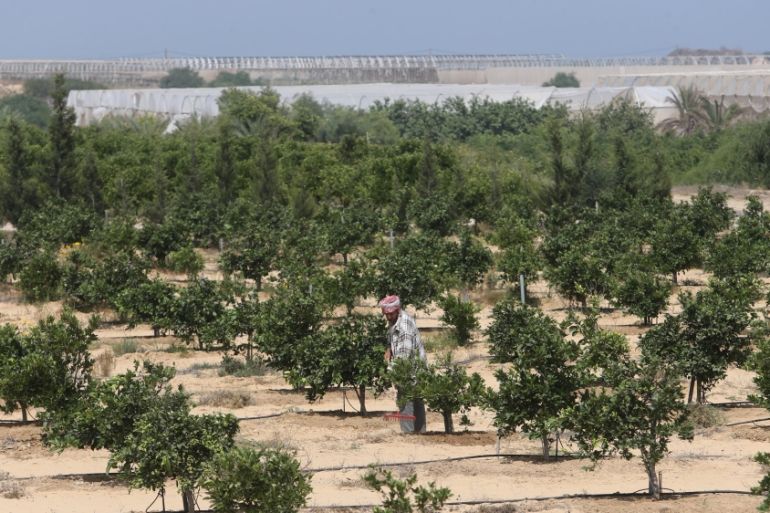Gaza farmers seek damages for Israel’s crop-spraying
Palestinian human rights groups fear that herbicides sprayed by the Israeli army could cause long-term damage.

Ibrahim Abu Taaymeh has grown spinach on land in the Gaza Strip for more than a decade.
But the Palestinian farmer from Khan Younis, in southern Gaza, says his harvest was destroyed after the Israeli army sprayed an unknown herbicide on lands in the buffer zone near the Israel-Gaza border fence in October 2014.
Keep reading
list of 4 itemsRussia-Ukraine war: List of key events, day 783
UN’s Libya envoy resigns citing no hope for political progress
The Take: Remembering one year of war in Sudan
The chemicals were blown on to Abu Taaymeh’s one-acre plot of land, which is located about 700 metres from the buffer zone and serves as the sole source of income for his family, human rights groups reported.
Since then, Abu Taaymeh has suffered about $3,000 in losses, believed to have resulted from both the aerial spraying and the Israeli-Egyptian blockade of the Gaza Strip, which has been strictly enforced since 2007.
IN PICTURES: Gaza’s farmers on frontlines of perpetual war
Late last month, a number of groups – including the Gaza-based Al Mezan Centre for Human Rights, the Adalah legal centre for Palestinians in Israel, and an Israeli group called Gisha that focuses on Palestinian freedom of movement – sent a letter to Israeli officials demanding an investigation into the crop-spraying incidents.
“We are trying to seek redress and compensation for some of these people because of the long-term damages,” said Mahmoud Abu Rahma, a spokesperson for Al Mezan, which is advocating on behalf of Abu Taaymeh and other farmers in Gaza. The rights groups say they will first wait for a response from Israeli authorities before considering whether to launch a formal lawsuit.
In a news release issued this week, Adalah alleged that the chemicals sprayed in October 2014 reached agricultural lands belonging to several Palestinian farmers. The human rights groups say that Israeli army aircraft sprayed unknown herbicides between October 11 and 13, 2014, on land located inside the buffer zone, a 300-metre-wide area that cuts into the Palestinian territory from the Gaza-Israel border fence.
Spraying crop-killing pesticides, like opening fire at people of all ages and gender in the vicinity of the fence, puts civilian lives at risk and hurts livelihoods.
The groups fear that the use of unknown chemicals may have a devastating long-term effect on agriculture in the Gaza Strip, Abu Rahma told Al Jazeera.
“Chemicals have already spilled over to adjacent land and have created serious damage to farmers beyond the buffer zone. We don’t know how it will impact the water resources, which are very scarce in Gaza,” he said. Crops have been destroyed and are failing to grow in areas that have been sprayed, Abu Rahma added.
The human rights groups are demanding that Israel immediately stop spraying herbicides in the Gaza buffer zone, apologise to the Palestinians affected, and compensate farmers for any damages they have incurred.
The Israeli military did not immediately respond to Al Jazeera’s request for comment on the matter.
In response to a series of questions submitted by the Gisha rights group earlier this year, however, an army spokesperson confirmed that it sprayed “herbicides and germination inhibitors” in order to “enable optimal and continuous security operations” in the area, and that the practice had been ongoing for more than two years.

“By virtue of Israel’s substantial control of the Gaza Strip, international law requires it to facilitate normal life in the Strip. Spraying crop-killing pesticides, like opening fire at people of all ages and gender in the vicinity of the fence, puts civilian lives at risk and hurts livelihoods,” Gisha spokesperson Shai Grunberg told Al Jazeera.
Israel has adjusted the dimensions of the Gaza buffer zone repeatedly over the past several years, and its exact size remains unclear.
In recent years, Israel has sprayed crops near the Gaza border fence at least once annually, Israeli human rights group Btselem reported. In December 2015, for example, Israel sprayed herbicides on Palestinian land 200 metres from the fence, the group said.
Palestinian farmers who enter or go near the buffer zone to tend to their lands have also routinely been shot at, injured and killed.
INTERACTIVE: Gaza’s restrictive fishing limits
Abu Rahma said dozens of Palestinian families with land in or near the buffer zone have been affected by the crop-spraying practice, and “will in the long term lose access to their farms and their sources of income”.
“These communities, with the fishermen, have become among the poorest in the Gaza Strip, and although they are farmers, they are dependent on humanitarian aid just to secure their food,” Abu Rahma said. “This is a serious violation of international law and should not happen.”
Regardless, he said that Palestinians’ expectations of holding Israel accountable have been tempered by Israel’s “very long, negative record” of ignoring calls to investigate human rights violations.
“We know that Israel is resisting any attempts to pressure it to abide by its own legislation and by its own international commitments,” Abu Rahma said. “[This case is only one] part of our attempts to challenge this very damaging culture of impunity that is very prevalent in Israel.”